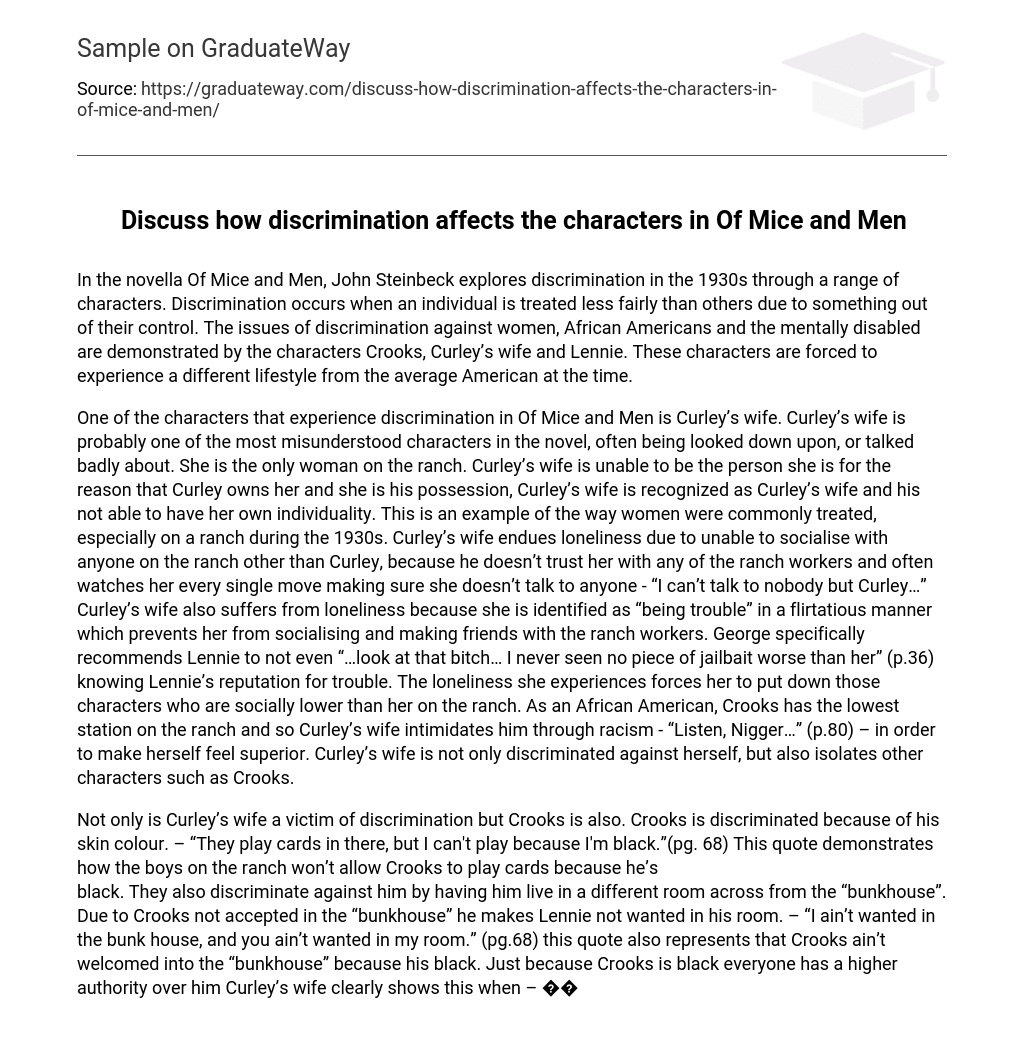John Steinbeck’s novella Of Mice and Men delves into the theme of discrimination in the 1930s, focusing on various characters. Discrimination emerges when individuals face unfair treatment based on factors beyond their control. The struggles surrounding discrimination against women, African Americans, and individuals with mental disabilities are exemplified through the personas of Crooks, Curley’s wife, and Lennie. These characters are compelled to endure a lifestyle distinct from the societal norm of the average American during that era.
Curley’s wife in Of Mice and Men is a character who faces discrimination and is often misunderstood. As the only woman on the ranch, she is owned by Curley and lacks her own identity. This reflects the common treatment of women during the 1930s. She experiences loneliness because she is not allowed to socialize with anyone other than Curley, and he closely monitors her interactions. Additionally, she is labeled as “trouble” and this prevents her from making friends with the other ranch workers. George warns Lennie to stay away from her due to her reputation. Feeling lonely, Curley’s wife puts down those who are socially lower than her on the ranch, such as Crooks, and uses racist comments to assert her superiority.Not only is Curley’s wife discriminated against, but she also isolates other characters, like Crooks.
Not only Curley’s wife, but also Crooks experiences discrimination. Crooks faces discrimination because of his skin color, as he remarks, “They play cards in there, but I can’t play because I’m black.”(pg. 68). This quote illustrates that the ranch boys exclude Crooks from playing cards simply because he is black. Additionally, they isolate him by assigning him a separate room across from the “bunkhouse”. As a result, Crooks, feeling unwelcome in the “bunkhouse”, rejects Lennie’s presence in his room, stating, “I ain’t wanted in the bunk house, and you ain’t wanted in my room.” (pg. 68). This quote also highlights that his blackness prevents him from being accepted into the “bunkhouse”. Curley’s wife further amplifies the power dynamics where everyone has authority over Crooks due to his race when she states, “…I could get you strung up on a tree so easy it ain’t even funny.” (p.g80). Crooks also faces rejection from other ranch workers as one declares, “You ain’t wanted here…” (p.g78). All of these challenges Crooks faces boil down to his uncontrollable skin color. These incidents undeniably demonstrate that Crooks has been subjected to discrimination.
Lennie’s character serves as a symbol for individuals who face mistreatment and discrimination due to their cognitive impairments. George frequently perceives Lennie as more of a responsibility than a companion and imagines that if he were alone, he could lead a simpler life without having to worry about his friend. George mentions, “…If I was alone I could live so easy” (pg.12).
Candy experiences ageism, meaning he faces discrimination based on his age. The other men at the ranch no longer value his dog and want him to put it down because it is deemed useless. This leads Candy to wonder whether he would face the same fate if he became useless. It raises the question of whether his old age should matter. The men always underestimate Candy’s abilities due to his age, even though he is capable. He shares, “I lost my hand right here on this ranch. That’s why they give me a job swampin’.” Throughout the story, Candy isolates himself from others because he feels rejected by them, much like Crooks.





